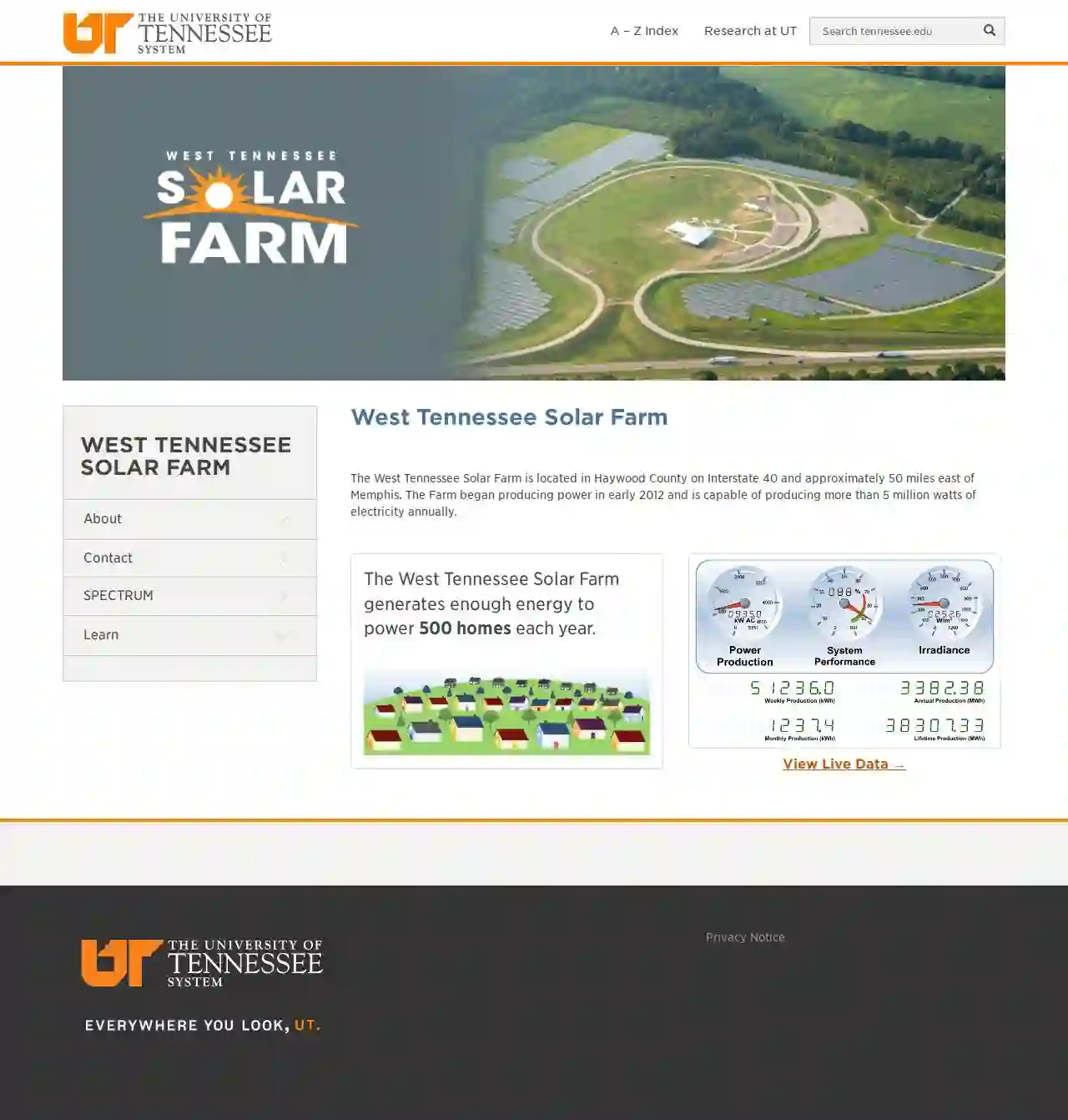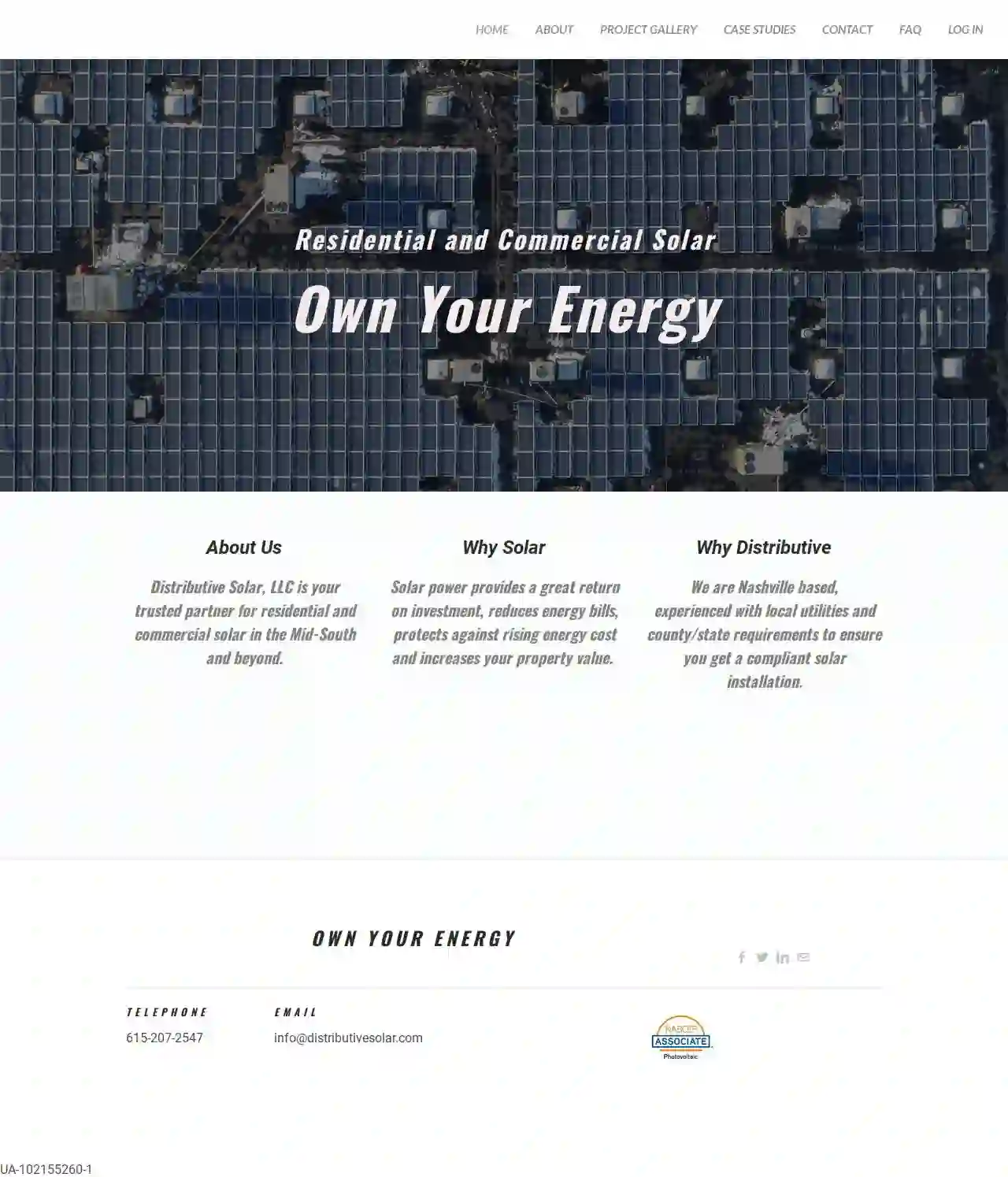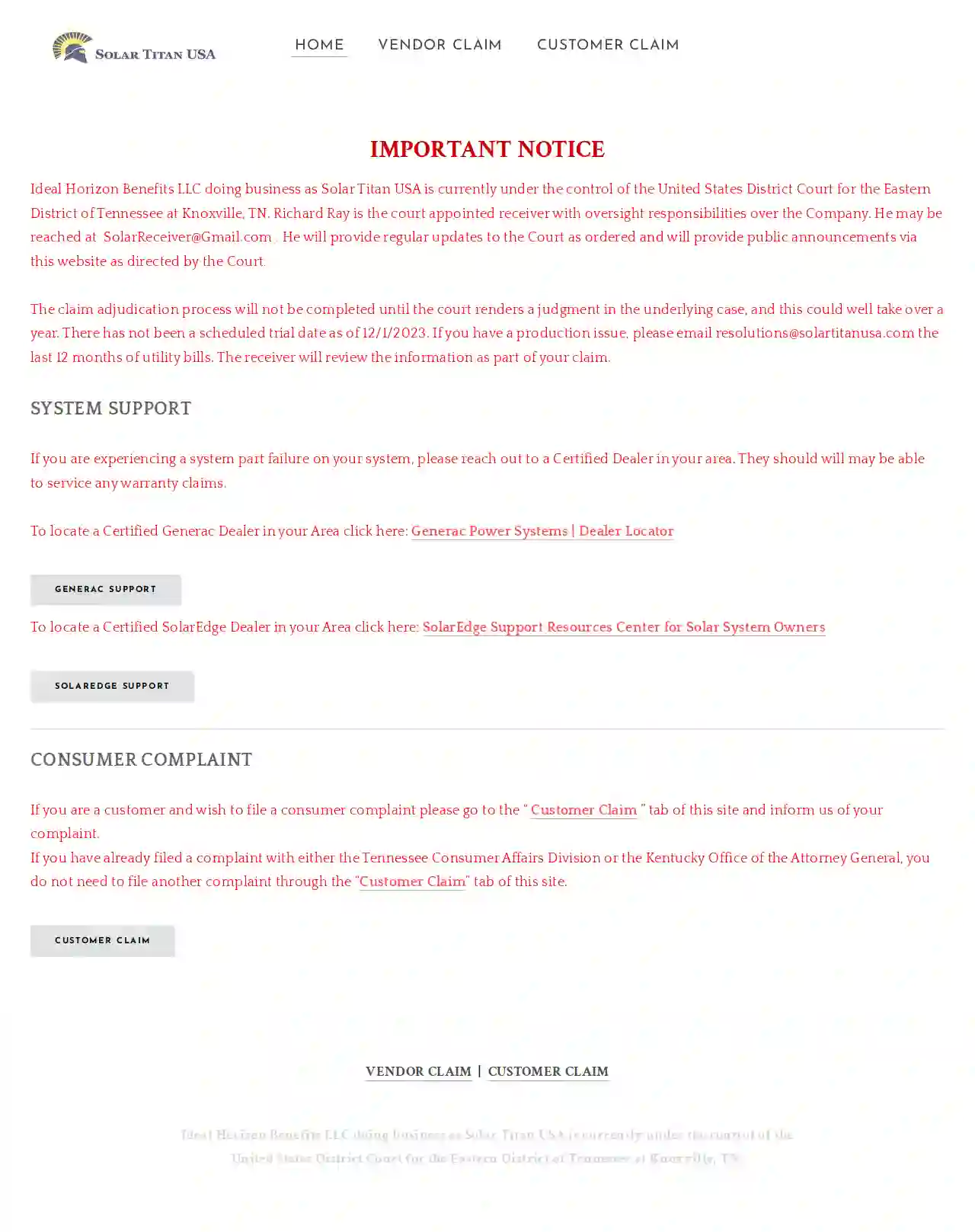Solar Installers Spring Hill
Find the best Residential Solar Installers in Spring Hill
Receive 3 FREE Solar Panel Installer quotes for your project today! Compare profiles, reviews, accreditations, portfolio, etc... and choose the best offer.

West Tennessee Solar Exhibit
4.6381 reviewsWest Tennessee Solar Farm, Haywood County, 123 Solar Road, Brownsville, 38053, USThe West Tennessee Solar Farm is located in Haywood County on Interstate 40 and approximately 50 miles east of Memphis. The Farm began producing power in early 2012 and is capable of producing more than 5 million watts of electricity annually. It generates enough energy to power 500 homes each year.
- Services
- Why Us?
- Accreditations
- Our Team
- Testimonials
- Gallery
Get Quote
Your Home Solar
58 reviewsKnoxville, TN, 816 Willow Avenue, 37915, USYour Home Solar is a solar energy company that specializes in providing residential solar solutions. They offer a range of services including solar panel installation, maintenance, and repair. The company is dedicated to providing high-quality service and ensuring customer satisfaction. They have a team of experienced professionals who are knowledgeable about solar energy and can help homeowners make the most out of their solar systems.
- Services
- Why Us?
- Accreditations
- Our Team
- Testimonials
- Gallery
Get Quote
Solar Insulation a Solar Art Company
4.777 reviewsNashville, TN, 475 Metroplex Dr Suite 409, 37211, USSolar Insulation Window Films has been proudly serving the Middle Tennessee-Southern Kentucky Area since 1975. With more than 45+ years of experience, we are the experts in window film installation, and the quality of our products and service goes unrivaled. We furnish and install premium residential and commercial window films, and help you protect your investment by offering the best warranties in the industry. Our films use cutting-edge technology and have many purposes that range from protection from the sun, to protection from storms and criminals! If you’re looking for high quality window tinting in Nashville, Middle Tennessee, or Southern Kentucky we have the right solutions for residential and commercial applications.
- Services
- Why Us?
- Accreditations
- Our Team
- Testimonials
- Gallery
Get Quote
JTE Solar Inc
55 reviews220 Great Circle Suite 140, Nashville, TN 37228, 37228, USJTE Solar Inc. is a Middle Tennessee company with a fully in-house team. We offer the best value available with no predatory loan agreements and the highest quality installation possible. Our team of experts will work with you to create a custom design that includes strategically placed solar panels and backup batteries to ensure your home is always powered, even during power outages.
- Services
- Why Us?
- Accreditations
- Our Team
- Testimonials
- Gallery
Get Quote
Midsouth Solar Pros
513 reviewsMemphis, TN, USA, 123 Solar Street, 38104, USMidsouth Solar Pros is a leading provider of solar solutions for residential and commercial properties in Tennessee, Mississippi, and Arkansas. They offer affordable solar panels that can save homeowners over $25,000 in electricity costs over 25 years and boost the value of their homes by up to 4.1%. Their team of experts focuses on making homes more energy-efficient and can install rooftop panels on various types of roofs. They also provide maintenance services for solar panels, including warranty repairs, inspections, and troubleshooting.
- Services
- Why Us?
- Accreditations
- Our Team
- Testimonials
- Gallery
Get Quote
Nashville Solar Works
531 reviews123 Solar Lane, Nashville, 37203, USNashville Solar Works is a boutique energy solutions company in Nashville providing PV system installation to homeowners and businesses across Tennessee. They offer a complimentary Energy Audit to help you maximize your solar installation in Tennessee.
- Services
- Why Us?
- Accreditations
- Our Team
- Testimonials
- Gallery
Get Quote
Astrawatt Solar
511 reviews3525 Roanoke Rd, Ste 110, Kansas City, 64111, USAstrawatt is a professional solar panel installer dedicated to providing better solar experiences. They offer comprehensive solar solutions including solar panels, batteries, and EV chargers. Their mission is to help homeowners save money on their electricity bills and contribute to a cleaner environment.
- Services
- Why Us?
- Accreditations
- Our Team
- Testimonials
- Gallery
Get Quote
Distributive Solar
54 reviewsNashville, TN, 37201, USDistributive Solar, LLC is your trusted partner for residential and commercial solar in the Mid-South and beyond. We provide a preliminary review of your energy usage, utility rate structure and site analysis to determine if solar makes sense for your property. Our team is experienced with local utilities and county/state requirements to ensure you get a compliant solar installation.
- Services
- Why Us?
- Accreditations
- Our Team
- Gallery
Get Quote
Solar Titan USA
3.6488 reviewsNashville, USIdeal Horizon Benefits LLC doing business as Solar Titan USA is currently under the control of the United States District Court for the Eastern District of Tennessee at Knoxville, TN. Richard Ray is the court appointed receiver with oversight responsibilities over the Company. He may be reached at [email protected] He will provide regular updates to the Court as ordered and will provide public announcements via this website as directed by the Court.
- Services
- Why Us?
- Gallery
Get Quote
Tennessee Solar Energy Industries Association
123 Solar Street, Suite 100, Nashville, 37201, USThe Tennessee Solar Energy Industries Association (TenneSEIA) is a non-profit organization that promotes the development of solar energy and complementary technologies in the Tennessee Valley. Their mission is to position the region's residents and businesses as leaders in clean energy deployment and economic development. TenneSEIA provides resources, events, and educational initiatives to support the growth of the solar industry in Tennessee.
- Services
- Why Us?
- Accreditations
- Our Team
- Testimonials
- Gallery
Get Quote
Over 4,210+ Solar Installers onboarded
Our solar installers operate in Spring Hill and surroundings!
SolarCompaniesHub has curated and vetted the Best Solar Installers in Spring Hill. Find the most trustworthy business today.
Frequently Asked Questions About Solar Installers
- Adequate Sunlight: Unobstructed sunlight for a significant portion of the day.
- Sufficient Space: Enough space to accommodate the desired number of panels.
- Structural Integrity: A strong roof structure capable of supporting the weight of the panels.
- Appropriate Orientation and Tilt: Ideally, the roof should face south (in the Northern Hemisphere) or north (in the Southern Hemisphere) with a tilt angle close to the latitude of your location. However, other orientations and tilts can still be effective.
- Use a Directory Like SolarCompaniesHub: We connect you with pre-screened, qualified solar installers in your area.
- Check Online Reviews: Look for positive reviews on Google, Yelp, and other reputable sources.
- Ask for Referrals: Get recommendations from friends, family, or neighbors who have gone solar.
- Verify Credentials: Ensure the installer is licensed, insured, and certified by reputable organizations (e.g., NABCEP in the US).
- Get Multiple Quotes: Compare quotes from at least 3-4 installers to find the best value for your project.
- Ask Questions: Don't hesitate to ask installers about their experience, warranties, and the process they follow.
- Tax Credits: Reduce your income tax liability based on the cost of your solar system.
- Rebates: Direct cash payments or discounts on the purchase of a solar energy system.
- Net Metering: Allows you to sell excess solar electricity back to the grid for credits.
- Renewable Energy Certificates (RECs): Tradeable credits representing the environmental attributes of your solar energy generation.
What happens to my solar panels during a power outage?
How do I know if my roof is suitable for solar panels?
How do I find a good solar installer near me?
Are there any financial incentives for going solar?
What happens to my solar panels during a power outage?
How do I know if my roof is suitable for solar panels?
- Adequate Sunlight: Unobstructed sunlight for a significant portion of the day.
- Sufficient Space: Enough space to accommodate the desired number of panels.
- Structural Integrity: A strong roof structure capable of supporting the weight of the panels.
- Appropriate Orientation and Tilt: Ideally, the roof should face south (in the Northern Hemisphere) or north (in the Southern Hemisphere) with a tilt angle close to the latitude of your location. However, other orientations and tilts can still be effective.
How do I find a good solar installer near me?
- Use a Directory Like SolarCompaniesHub: We connect you with pre-screened, qualified solar installers in your area.
- Check Online Reviews: Look for positive reviews on Google, Yelp, and other reputable sources.
- Ask for Referrals: Get recommendations from friends, family, or neighbors who have gone solar.
- Verify Credentials: Ensure the installer is licensed, insured, and certified by reputable organizations (e.g., NABCEP in the US).
- Get Multiple Quotes: Compare quotes from at least 3-4 installers to find the best value for your project.
- Ask Questions: Don't hesitate to ask installers about their experience, warranties, and the process they follow.
Are there any financial incentives for going solar?
- Tax Credits: Reduce your income tax liability based on the cost of your solar system.
- Rebates: Direct cash payments or discounts on the purchase of a solar energy system.
- Net Metering: Allows you to sell excess solar electricity back to the grid for credits.
- Renewable Energy Certificates (RECs): Tradeable credits representing the environmental attributes of your solar energy generation.